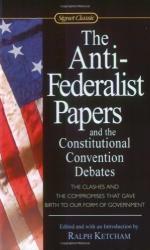
|
| Name: _________________________ | Period: ___________________ |
This test consists of 15 multiple choice questions and 5 short answer questions.
Multiple Choice Questions
1. What was James Madison's feeling about the compromise?
(a) He felt that the convention was sacrificing federalism to distributed power.
(b) He felt that the convention was sacrificing large states to small states.
(c) He felt that the convention was sacrificing justice for the small states.
(d) He felt that the convention was striking the right balance.
2. What did the delegates debate concerning state laws?
(a) Whether state laws could govern inter-state trade.
(b) Whether state laws could set precedent for federal laws.
(c) Whether the federal government could control state laws.
(d) Whether the states could allow the death penalty.
3. What were opponents of the resolution that was ultimately adopted afraid of?
(a) That trade would be stifled.
(b) That foreign countries would be able to divide and conquer.
(c) That the federal government would become too powerful.
(d) That the states would gain too much independence.
4. What opinion bolstered Mr. Sherman's view about where election should take place?
(a) He believed in a strong democracy.
(b) He believed that people could be trusted with self-governance.
(c) He believed that the populace could be misled.
(d) He believed that small states needed equal representation.
5. Where did Mr. Sherman say election should take place?
(a) In the state legislatures.
(b) Among sitting representatives.
(c) In the popular polls.
(d) In the Electoral College.
6. Who was particularly concerned about the Virginia Plan?
(a) Small states.
(b) Populous states.
(c) Large states.
(d) Southern states.
7. Where did Mr. Gerry think the country's current troubles came from?
(a) Too little representation in government.
(b) Too little religion.
(c) Too much democracy.
(d) Too much foreign influence.
8. What reason did delegates give for Senators being elected in state legislatures?
(a) They would have the contacts they needed within the state.
(b) They would therefore be essentially promoted from within.
(c) They would therefore be men of character.
(d) They would already know the laws.
9. What were the delegates debating in Chapter 3?
(a) The election of the President.
(b) The election of the House of Representatives.
(c) The election of Senators.
(d) The appointment of judges.
10. What did Randolph argue at the convention?
(a) That the government needs to be strong to serve its purposes.
(b) That the Articles of Confederation were sufficient.
(c) That the Constitution would need to stress diplomacy with foreign nations.
(d) That the states should be trusted with managing their own affairs.
11. What did the New Jersey Plan allow the federal government to do?
(a) Tax intra-state commerce.
(b) Support a Supreme Court.
(c) Maintain a standing army.
(d) Regulate slavery.
12. How did the South want the Constitution to regulate trade?
(a) The South wanted the Constitution not to regulate trade at all.
(b) The South wanted the Constitution to keep Congress from restricting trade.
(c) The South wanted the Constitution to let Congress set tariffs with a simple majority vote.
(d) The South wanted the Constitution to keep tariffs low indefinitely.
13. What happened to the motion not to give government officers salaries?
(a) It was tabled to be voted on later.
(b) It was killed in committee.
(c) It was rejected as impractical.
(d) It was rejected as too aristocratic.
14. What did Mr. Sherman argue during the debate over the length of Senatorial term-lengths?
(a) Short terms allow bad rulers to be removed.
(b) Short terms create perpetual campaigns.
(c) Long terms allow leaders to learn on the job.
(d) Long terms will preserve continuity in government.
15. Why did delegates argue for a judicial veto power?
(a) To prevent bad executive judgment.
(b) To correct bad laws.
(c) To prevent corruption.
(d) To protect small states.
Short Answer Questions
1. What were the delegates' intentions when they argued for election of Senators from state legislatures?
2. What was the dominant fear about the executive?
3. What did James Madison argue with relation to the New Jersey Plan?
4. What plan did James Madison favor?
5. Which form of government includes a representative government without hereditary privilege?
|
This section contains 701 words (approx. 3 pages at 300 words per page) |

|




